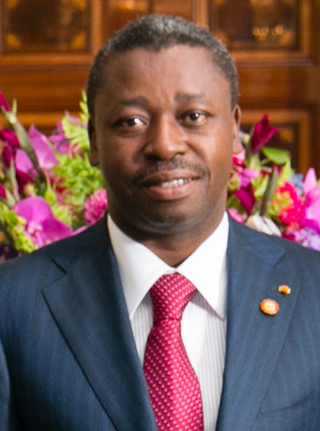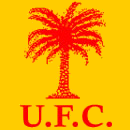
The two-round system, also called ballotage, top-two runoff, or two-round plurality, is a single winner voting method. It is sometimes called plurality-runoff, although this term can also be used for other, closely-related systems such as instant-runoff voting or the exhaustive ballot. It falls under the class of plurality-based voting rules, together with instant-runoff and first-past-the-post (FPP). In a two-round system, if no candidate receives a majority of the vote in the first round, the two candidates with the most votes in the first round proceed to a second round where all other candidates are excluded. Both rounds are held under choose-one voting, where the voter marks a single favored candidate.
The history of Togo can be traced to archaeological finds which indicate that ancient local tribes were able to produce pottery and process tin. During the period from the 11th century to the 16th century, the Ewé, the Mina, the Gun, and various other tribes entered the region. Most of them settled in coastal areas. The Portuguese arrived in the late 15th century, followed by other European powers. Until the 19th century, the coastal region was a major slave trade centre, earning Togo and the surrounding region the name "The Slave Coast".
Norway elects its legislature on a national level. The parliament, the Storting, has 169 members elected for a four-year term by a form of proportional representation in multi-seat constituencies.

Open list describes any variant of party-list proportional representation where voters have at least some influence on the order in which a party's candidates are elected. This is as opposed to closed list, in which party lists are in a predetermined, fixed order by the time of the election and gives the general voter no influence at all on the position of the candidates placed on the party list.
Regular elections in Croatia are mandated by the Constitution and legislation enacted by Parliament. The presidency, Parliament, county prefects and assemblies, city and town mayors, and city and municipal councils are all elective offices. Since 1990, seven presidential elections have been held. During the same period, ten parliamentary elections were also held. In addition, there were nine nationwide local elections. Croatia has also held three elections to elect members of the European Parliament following its accession to the EU on 1 July 2013.

Elections in Ukraine are held to choose the president, Verkhovna Rada (legislature), and local governments. Referendums may be held on special occasions. Ukraine has a multi-party system, often no single party has a chance of gaining power alone, and parties must work with each other to form coalition governments.

Elections in Benin take place within the framework of a multi-party democracy and a presidential system. Both the President and the National Assembly are directly elected by voters, with elections organised by the Autonomous National Electoral Commission (CENA).

Elections in Togo take place within the framework of a presidential system. Both the President and the National Assembly are directly elected by voters. Togo is a one party dominant state with the Union for the Republic in power.

Presidential elections were held in Togo on 24 April 2005, following the death in office of long-time president Gnassingbé Eyadéma. The main candidates were Eyadéma's son, Faure Gnassingbé, and opposition leader Emmanuel Bob-Akitani. The elections and the preceding period were marked by violence, with many people reported killed in various incidents. According to the official results, Gnassingbé won the election, taking slightly more than 60% of the vote. Violence flared in the capital Lomé after the results were announced, and thousands fled into neighboring countries.

Édouard Kodjovi "Edem" Kodjo, was a Togolese politician and diplomat. He was Secretary-General of the Organisation of African Unity from 1978 to 1983; later, in Togo, he was a prominent opposition leader after the introduction of multi-party politics. He served as Prime Minister from 1994 to 1996 and again from 2005 to 2006. Kodjo was President of the Patriotic Pan-African Convergence (CPP). Kodjo died on April 11, 2020, in Paris.

The Union of Forces for Change is an opposition political party in Togo. The President of the UFC was Gilchrist Olympio and its Secretary-General was Jean-Pierre Fabre until 10 August 2010. Olympio is the son of the first President of Togo, Sylvanus Olympio, who was assassinated in a 1963 coup. On 10 August 2010, Jean-Pierre Fabre was elected as President of the party.

The Democratic Convention of African Peoples is a political party in Togo. It is a consultative member of Socialist International.
The Pan-African Patriotic Convergence is a political party in Togo. Former Prime Minister Edem Kodjo is the President of the CPP as of 2007.
Yawovi Madji Agboyibo was a Togolese attorney and politician. He served as Prime Minister of Togo from September 2006 to December 2007 and was National President of the Action Committee for Renewal (CAR), an opposition political party, from 1991 to 2008. He was the Honorary President of the CAR.

Parliamentary elections were held in Togo on October 14, 2007 for the 81 seats in the National Assembly. There were over 2,000 candidates, with 32 parties and 41 lists of independent candidates competing. The ruling Rally of the Togolese People (RPT) was victorious, winning a majority of 50 seats. The remaining seats were won by opposition parties; the Union of the Forces of Change (UFC) won 27 seats and the Action Committee for Renewal (CAR) won four seats. They were the first parliamentary elections since the beginning of multiparty politics in the early 1990s in which all major parties participated.

Presidential elections were held in Togo on 4 March 2010. Incumbent President Faure Gnassingbé—who won his first term in a presidential election that followed the death of his father, long-time President Gnassingbé Eyadema, in 2005—faced radical opposition candidate Jean-Pierre Fabre, the Secretary-General of the Union of the Forces of Change (UFC), as well as several minor opposition candidates.

General elections were held in Togo on 30 December 1979, alongside a constitutional referendum that confirmed the country's status as a one-party state. Gnassingbé Eyadéma, who had led a coup in 1967, was elected President unopposed, whilst the Rally of the Togolese People won all 67 seats in the National Assembly as its list of 67 candidates was approved by voters. Voter turnout was reported to be 99.3% in the parliamentary election and 99.4% in the presidential election.

Parliamentary elections were held in Togo on 4 March 1990, with a second round on 18 March in eight constituencies. The country was a one-party state at the time, with the Rally of the Togolese People as the sole legal party. The election won contested by 230 candidates running for 77 seats. Voter turnout was 78.7%.

Parliamentary elections were held in Togo on 27 October 2002. Like the previous elections in 1999, they were boycotted by nine opposition parties, following the replacement of the Independent National Electoral Commission by a seven-magistrate committee and a revision of the Electoral Code. The result was a victory for the ruling Rally of the Togolese People, which won 72 of the 81 seats. Voter turnout was 67%.

Parliamentary elections were held in Togo on 29 April 2024 to elect the 113 members of the National Assembly, alongside the first regional elections in the country. The ruling Union for the Republic won 108 of the 113 seats.








